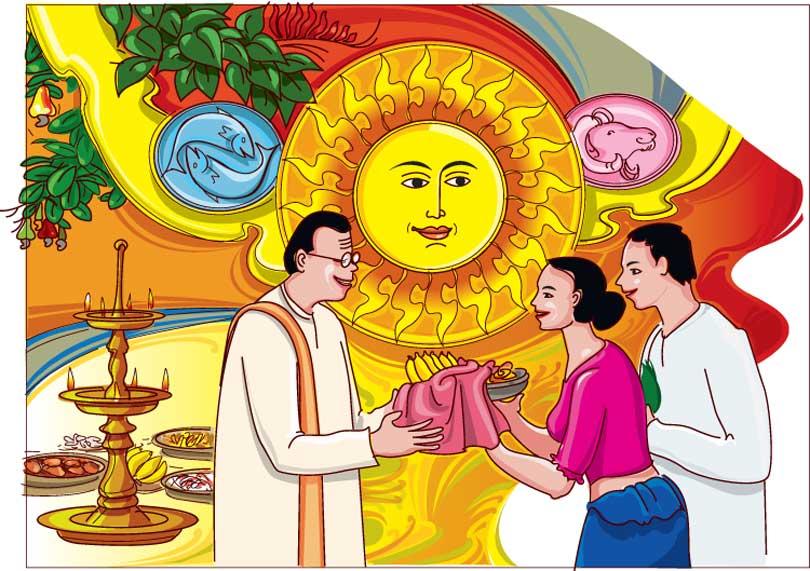Reply To:
Name - Reply Comment

Tomorrow, Sri Lanka’s people rise beyond racial or religious differences, class or caste differences to celebrate the National New Year, known as Aluth Avurudda in Sinhala or Puthandu in Tamil. January 1 is only a calendar change based on Gregorian concepts introduced 437 years ago. But the National New Year has astronomical, cultural and other significant factors dating back to thousands of years. Astronomically, the New Year marks the movement of the all-powerful sun from Meena (Pisces) to Mesha (Aries).
The sun gives all people energy, light and power and if we have no sun for about three days, possibly everyone and everything will perish even though we now have modern technology, for genetic modification, cloning, artificial intelligence and other marvels. We also are aware that most of the food we eat – vegetables and fruits – need sunlight for the process of photosynthesis or carbohydration through which the trees prepare food for us. Even meat or fish eaters know that without the sun for a few days, the animals and the fish will perish. So essentially, this National New Year is a day on which people say ‘Thank You’ to the sun and nature for all that they have given us throughout the year. This year too, despite the prolonged drought and the hottest days of the year with the sun directly above Sri Lanka, many farming communities will offer parts of their harvest to the sun and nature deities.
Culturally, it is the only festival that the Buddhists and Hindu people mainly and also others celebrate together. Therefore, in this crucial year of presidential or other elections, the people need to unite and come out strongly by preventing power-hungry or self–seeking party politicians from trying to further divide the nation.
Reports indicate that the new Sri Lanka Podujana Peramuna (SLPP) architect and chief strategist Basil Rajapaksa is even trying to field a Tamil candidate in a bid to reduce the vote of the ruling United National Front (UNF). The former powerful defence secretary Gotabaya Rajapaksa was virtually confirmed as the SLPP’s candidate for the presidential election, but he is a dual citizen of Sri Lanka and the United States. Gotabaya Rajapaksa went to the US recently, in a reported bid to expedite the renunciation of his US citizenship, so that he could contest the presidential election. But two cases have been filed against him in a Los Angeles court, one of them by Ahimsa Wickrematunge, daughter of the Sunday Leader’s founder editor and investigative journalist Lasantha Wickrematunge who was brutally killed in a high-security zone near his office on January 8, 2009.Gotabaya Rajapaksa returned to Sri Lanka yesterday. There was a large crowd at the airport to welcome him and he expressed confidence of getting his US citizenship revoked.
If Gotabaya Rajapaksa fails to get a cancellation of his US citizenship before November this year, it is not clear who the SLPP’s candidate would be. President Maithripala Sirisena is also reported to be thinking of contesting from the Sri Lanka Freedom Party whose parliamentarians are split down the middle, while his chances of getting SLPP backing are reportedly nil. The Rajapaksas apparently want to keep the presidency within the family though this nepotism goes against the basic principles of democracy.
As for the ruling UNF, there are still questions as to who its nominee will be for this year’s presidential election. Prime Minister Ranil Wickremesinghe’s close supporters insist he will be the candidate but there is increasing speculation that Speaker Karu Jayasuriya or the Housing, Construction and Cultural Affairs Minister Sajith Premadasa may be nominated mainly because the Rajapaksa family and the SLPP are still taking a Sinhala Buddhist line and warning of a division in the country if the UNF wins. Both Mr. Jayasuriya and Mr. Premadasa got the highest honour from the Mahanayaka of the Malwatta Chapter recently and many saw it as a boost to their chances of getting the presidential nomination.
Party politics apart, we hope Sri Lanka’s responsible citizens will make full use of the National New Year’s cultural traditions to build closer ties among the people through Ahimsa or non–violence and the spirit of dialogue for conflict resolution. Whatever the issue, we need to be aware that our views are always relative and never absolute. If we come to that paradigm shift and stop being know–alls, we will be able to listen to the views of the others and come to some accommodation on the middle path. This is called the path of synergy, which means 1 + 1 makes not 2, but 3. That means two different people’s views when put together will produce something new and good for the country. That is our deepest wish for the National New Year.